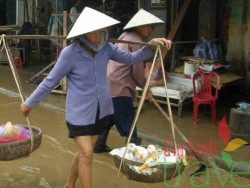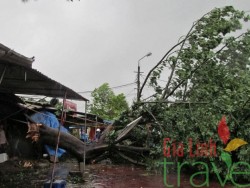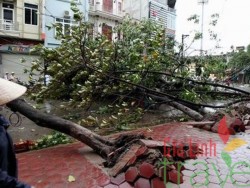Flood in Vietnam
Extreme Weather
Extreme Weather


Tropical storms

Typhoon in Vietnam
Extreme Weather
Surprisingly, Vietnam’s weather just isn’t notably extreme, aside from torrential rain in areas that experience summer time or autumn monsoons, drought situations in some locations and, occasionally, typhoons.
Typhoons
‘Hurricane’ is the identify used in the west Pacific/Vietnam East Sea area for tropical cyclones. They are small, but very intense, low-pressure areas that produce violent winds and torrential rain.
The tropical cyclones that have an effect on Vietnam type over the ocean in a band stretching from the equator to latitude 50 norths, and then transfer slowly northward following a well-defined clockwise course at around 20km per hour. A completely developed cyclone has a diameter ranging between 150km to 300km, and is without doubt one of the most destructive forces in nature.
Vietnam is nicely to the north of the tropics, so the facility of typhoons is weakened by the time they attain its coast. Even so, a storm will usually have retained sufficient power to devastate crops and buildings, and a few times trigger lack of life amongst folks dwelling in central coastal areas. Fortunately, its slow strategy offers plenty of time to rearrange itineraries if necessary.
For those who travel with Gia Linh Travel, we’ll be monitoring the weather and will concentrate on the strategy of a typhoon several days prematurely – plenty of time for schedules to be re-routed to keep away from any risk.
Tropical storms
Tropical storms are frequent within the summer. Sometimes, they’re preceded by a darkening of the sky, a drop in temperature and a fresh wind. Shortly after, the storm heralds its arrival by lightning and a colossal clap of thunder. The noise and flashes proceed for a while, and rain begins to fall, slowly at first, then a deluge. After an hour or two, the rain stops, the skies clear and the temperature and humidity rise rapidly. Tropical storms tend to happen extra commonly in
Afternoons or at night.
Tropical storms are spectacular and noisy, but do little more than give guests a soaking if they’re unlucky sufficient to be caught with out shelter. In fact, warnings about not standing beneath tall trees, playing golf, etc. in thunderstorms apply to tropical storms as well!
The Central Coast
Typhoons are most prevalent in the Central Coast provinces. From October to the beginning of December, the coastline is battered by a sequence of storms with torrential rain and robust winds often inflicting severe flooding, in depth damage to property and, in the past, considerable loss of life.
There are occasional heavy hailstorms within the Central Area. Hailstones can reach the scale of golf balls and are clearly dangerous, but happen very infrequently. Damage is often confined to crops, roof tiles, glass and vehicles.
The Central Highlands
The Central Highland plateau and other central and southern areas are susceptible to prolonged heat waves causing drought and salivation of lakes and rivers in the early months of the year. Though posing considerable problems for farmers, visitors will not be affected.
Flooding can also happen elsewhere in the nation, notably in the Hue area and on the Pink River delta. The primary implication for visitors is the need to revise itineraries and/or change from road or rail to air travel if flooding is extreme sufficient to affect land routes
